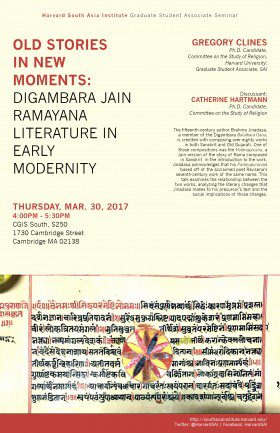Old Stories in New Moments: Digambara Jain Rāmāyaṇa Literature in Early Modernity
WHEN
Thu, Mar 30, 2017 from 04:00pm — 05:30pm, ET
{
"name":"Old Stories in New Moments: Digambara Jain Rāmāyaṇa Literature in Early Modernity",
"description":"Graduate Student Associate Seminar Gregory Clines, Ph.D. Candidate, Committee on the Study of Religion, Harvard University; Graduate Student Associate, SAI Discussant: Catherine Hartmann, Ph.D. Candidate, Committee on the Study of Religion The fifteenth-century author Brahma Jinadāsa, a member of the Digambara Balatkāra Gaṇa, is credited with composing over eighty works in both Sanskrit and Old Gujarati. One of […]",
"startDate":"2017-03-30",
"endDate":"2017-03-30",
"startTime":"16:00",
"endTime":"17:30",
"location":"",
"label":"Add to Calendar",
"options":[
"Apple",
"Google",
"iCal",
"Microsoft365",
"MicrosoftTeams",
"Outlook.com",
"Yahoo"
],
"timeZone":"America/New_York",
"inline":true,
"listStyle":"dropdown-static",
"iCalFileName":"Mittal-Event-2017-03-30"
}
Graduate Student Associate Seminar
Gregory Clines, Ph.D. Candidate, Committee on the Study of Religion, Harvard University; Graduate Student Associate, SAI
Discussant: Catherine Hartmann, Ph.D. Candidate, Committee on the Study of Religion
The fifteenth-century author Brahma Jinadāsa, a member of the Digambara Balatkāra Gaṇa, is credited with composing over eighty works in both Sanskrit and Old Gujarati. One of those compositions was the Padmapurāṇa, a Jain version of the story of Rāma composed in Sanskrit. In the introduction to the work, Jinadāsa acknowledges that his Padmapurāṇa is based off of the acclaimed poet Raviṣeṇa’s seventh-century work of the same name. This talk examines the relationship between the two works, analyzing the literary changes that Jinadāsa makes to his precursor’s text and the social implications of those changes.

